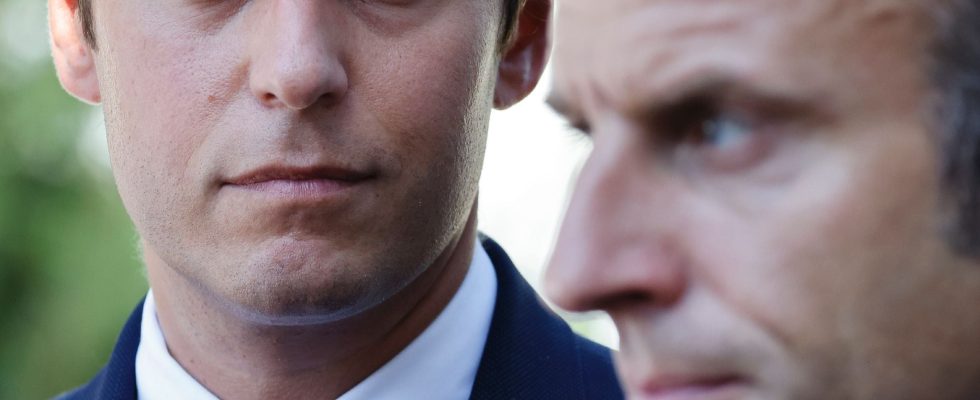This is called a doom and gloom. In 2014, the European elections took place 56 days after the arrival of Manuel Valls in Matignon. After disastrous municipal elections for the left in March, Jean-Marc Ayrault tried to convince François Hollande to keep him until the June election, but the socialist president preferred to change everything, expecting a revival for the executive. “Valls was very popular at the time at Place Beauvau, he was the Gabriel Attal of the Interior in a way,” he remembers.
On arrival, the impact of the change of head of government on the result of the European elections is zero: Marine Le Pen triumphs in the European elections with almost 25%, and the PS led by Jean-Christophe Cambadélis achieves a score judged by catastrophic era: less than 14%. And what happens next at the top of the state? Almost nothing changes, the five-year term continues as before.
National life has an influence on the results of European elections, but do European elections have an influence on national life? This year, like Jean-Marc Ayrault in his time, Elisabeth Borne, until the last minute, tried to persuade Emmanuel Macron to extend his lease at least until June, she proposed to him to widely modify the architecture as the composition of its government. The president did not listen to her. Gabriel Attal arrived in Matignon exactly five months before the election and, for the moment, this has not led to any change in the balance of power as measured by the polls. The RN is largely in the lead, wanting to nationalize the vote as much as possible. “These elections will mark day 1 of the alternation,” he said on Sunday: Jordan Bardella already promises to request the dissolution of the National Assembly on the evening of June 9 if he comes out on top – Marine Le Pen is in much less of a hurry to follow him on this ground.
A delicate moment to spend
For his part, Gabriel Attal tries not to allow too much nationalization of the countryside, which is why he refuses, for example, to debate with the head of the RN list. The government agenda is set to respect the basic principle of this election: to mobilize its own electorate without over-mobilizing that of the adversary. The unemployment insurance reform or the juvenile justice bill will be discussed before June 9, while the civil service reform, for example, will wait until the summer.
Barring an earthquake, Gabriel Attal should continue his lease in Matignon, only the climate at the top of the State will be different depending on whether the result is excellent, good, bad or catastrophic. The institutions of the Fifth generally allow the executive to bypass the European elections, even if it is a delicate moment to go through. This was the case, as we saw, in 2014, it was also the case in 2019: while the presidential majority is ahead, certainly narrowly, by the far right, the government of Edouard Philippe continues its little man of path.
It happens that the president takes advantage of a happy surprise to stage a rebound. In 2009, Nicolas Sarkozy waited for the results of the European elections before going to speak for the first time as President of the Republic before the parliament meeting in Congress in Versailles (this is one of the consequences of the constitutional reform of the last year). He launched the idea of a large national loan. The next day, he reshuffled his government a little: a certain Rachida Dati left the Chancellery after her election to the Strasbourg parliament – it was Nicolas Sarkozy who wanted her to be a candidate. And the Head of State pulls off a media coup, in Culture (definitely): he appoints Frédéric Mitterrand.
Beware of optical illusions
But we must not think that the European elections are elections without national issues. They have already caused deaths, it has even happened quite often. In 1994, Michel Rocard, who aims to succeed François Mitterrand, does not recover from his fiasco, notably caused by the Tapie list: he will not be a candidate for the Elysée in 1995. In 2019, Laurent Wauquiez must resign from the presidency of LR after the Bellamy failure and he will be forced to take his turn in the 2022 presidential election.
If the vote can also make people happy, beware of optical illusions. The harder the fall will be, the Greens are the specialists. Latest example, Yannick Jadot obtained 13.5% in the Europeans in 2019, he is the third man. In the next presidential election, in 2022, it is below 5%.
This time, the stakes are high for both the right and the left. The first must know how and with whom it enters the battle for the 2027 presidential election – Laurent Wauquiez, Edouard Philippe, Xavier Bertrand and even Valérie Pécresse will be attentive to the results; the second must reorganize itself between its rebellious and reforming poles, the fate and future of the socialists may depend on the performance of Raphaël Glucksmann. Issues that will encourage voters to come out? In 2019, for the first time, participation in the European elections was higher than that in the 2022 legislative elections.
.
